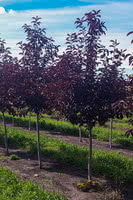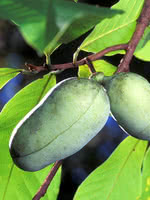Mon-Fri 9am - 5pm Mountain time
Robert Chokecherry vs Pawpaw
Prunus virginiana Robert
Asimina triloba
NOT AVAILABLE THIS SEASON - MIGHT RETURN
Developed in Barrhead, Alberta, the Robert Chokecherry produces very large berries (comparable to the size of grapes) with good yield.
The berries can be used for wine, jams, jellies and fresh picking, making it one of the sweeter chokecherries. Rich, red foliage make it a striking landscape addition.
The Pawpaw tree produces delicious, sweet fruit with a unique banana-mango flavor. These oblong fruits start yellowish-green and mature to a dark brown in the fall. It is best to leave them on the tree until ripe, as they do not ripen well once picked. Pawpaws can be enjoyed fresh, in baking, or in ice cream.
Pawpaws produce the largest native fruit in North America. They typically grow as a small understory tree or large shrub on wooded slopes, in ravines, and along stream banks. They often spread through root suckers, forming dense thickets over time.
For fruit production to occur more than one genetically different Pawpaw tree is required. Our Pawpaw seedlings are grown from seed so they are all genetically different.
Note: Avoid eating the seeds and skin of the Pawpaw fruit as they can cause stomach pain for some individuals. Contact with the skin of the fruit can also result in skin irritation, so it is recommended to wear gloves during harvest. Plant this tree once. Due to its large tap root transplanting is not recommended.
Robert Chokecherry Quick Facts
Pawpaw Quick Facts
Toxicity: Toxic to animals with segmented stomachs (horses, cattle, deer moose, etc.)

